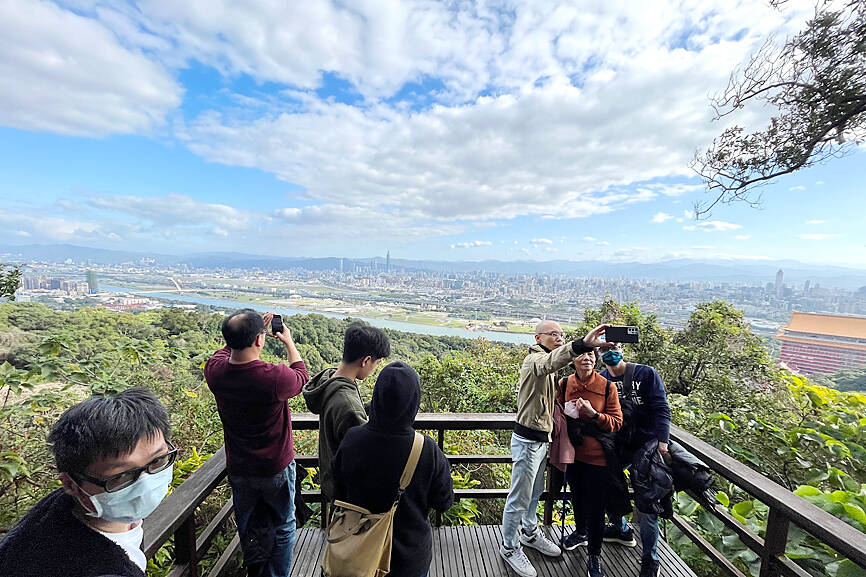Taiwan was ranked the fourth-happiest country in Asia, the second-happiest in East Asia and 27th in the world, in the World Happiness Report released on Monday by the UN Sustainable Development Solutions Network.
The report compiled data from surveys conducted in more than 150 countries and territories to measure happiness based on average evaluations over a three-year period. It used six factors — social support, income, health, freedom, generosity and absence of corruption — to evaluate happiness levels in countries around the world.
In the broad Asia grouping, Taiwan trailed Israel (No. 4 globally), Singapore (No. 25) and the United Arab Emirates (No. 26), but ranked second for East Asia behind Singapore and ahead of Japan (No. 47).

Photo: CNA
In the previous report, Taiwan was ranked fourth in the broader Asia grouping, after Bahrain, the United Arab Emirates and Saudi Arabia, while ranking No. 1 among countries in East Asia.
Worldwide, Taiwan ranked No. 27, down one spot from a year earlier.
Finland, with a population of 5.5 million and which boasts a comprehensive welfare system, a high degree of equality and a high level of trust in the government by its citizens, was ranked as the No. 1 happiness country in the world for the sixth consecutive year, ahead of Denmark, Iceland, Israel, the Netherlands, Sweden, Norway, Switzerland, Luxembourg and New Zealand.
The Nordic country and its neighbors Denmark, Iceland, Sweden and Norway scored well because they “all have high ranks for both happiness and equality,” the report said.
“The Nordic countries merit special attention in light of their generally high levels of both personal and institutional trust,” it said.
The US was ranked the 15th-happiest country, while China and Hong Kong were ranked 64th and 82nd respectively.
Despite being invaded by Russia, Ukraine’s happiness ranking rose to 92nd, from 98th a year earlier. Russia was ranked 70th.
“Despite the magnitude of suffering and damage in Ukraine, life evaluations in September 2022 remained higher than in the aftermath of the 2014 annexation [of Crimea], supported by a stronger sense of common purpose, benevolence and trust in the Ukrainian leadership,” the report said.
Afghanistan remained at the bottom of the report, and has been ranked the unhappiest nation since 2020, when US troops began withdrawing from the country.

Taiwan is stepping up plans to create self-sufficient supply chains for combat drones and increase foreign orders from the US to counter China’s numerical superiority, a defense official said on Saturday. Commenting on condition of anonymity, the official said the nation’s armed forces are in agreement with US Admiral Samuel Paparo’s assessment that Taiwan’s military must be prepared to turn the nation’s waters into a “hellscape” for the Chinese People’s Liberation Army (PLA). Paparo, the commander of the US Indo-Pacific Command, reiterated the concept during a Congressional hearing in Washington on Wednesday. He first coined the term in a security conference last

Prosecutors today declined to say who was questioned regarding alleged forgery on petitions to recall Democratic Progressive Party (DPP) legislators, after Chinese-language media earlier reported that members of the Chinese Nationalist Party (KMT) Youth League were brought in for questioning. The Ministry of Justice Investigation Bureau confirmed that two people had been questioned, but did not disclose any further information about the ongoing investigation. KMT Youth League members Lee Hsiao-liang (李孝亮) and Liu Szu-yin (劉思吟) — who are leading the effort to recall DPP caucus chief executive Rosalia Wu (吳思瑤) and Legislator Wu Pei-yi (吳沛憶) — both posted on Facebook saying: “I

Sung Chien-liang (宋建樑), who led efforts to recall Democratic Progressive Party (DPP) Legislator Lee Kun-cheng (李坤城), was released on bail of NT$80,000 today amid outcry over his decision to wear a Nazi armband to questioning the night before. Sung arrived at the New Taipei District Prosecutors’ Office for questioning in a recall petition forgery case last night wearing a red armband bearing a swastika, carrying a copy of Adolf Hitler’s Mein Kampf and giving a Nazi salute. Sung left the building at 1:15am without the armband and covering the book with his coat. Lee said today that this is a serious

The Ministry of Economic Affairs has fined Taobao NT$1.2 million (US$36,912) for advertisements that exceed its approved business scope, requiring the Chinese e-commerce platform to make corrections in the first half of this year or its license may be revoked. Lawmakers have called for stricter enforcement of Chinese e-commerce platforms and measures to prevent China from laundering its goods through Taiwan in response to US President Donald Trump’s heavy tariffs on China. The Legislative Yuan’s Finance Committee met today to discuss policies to prevent China from dumping goods in Taiwan, inviting government agencies to report. Democratic Progressive Party Legislator Kuo Kuo-wen (郭國文) said